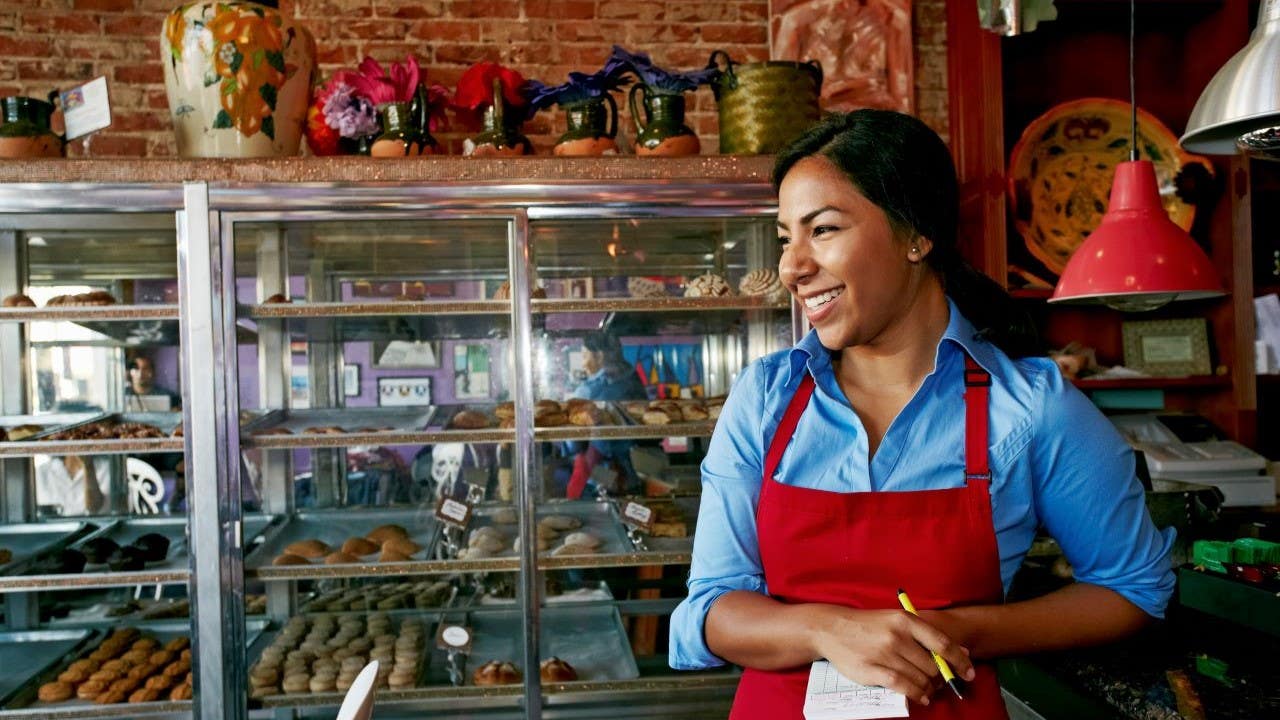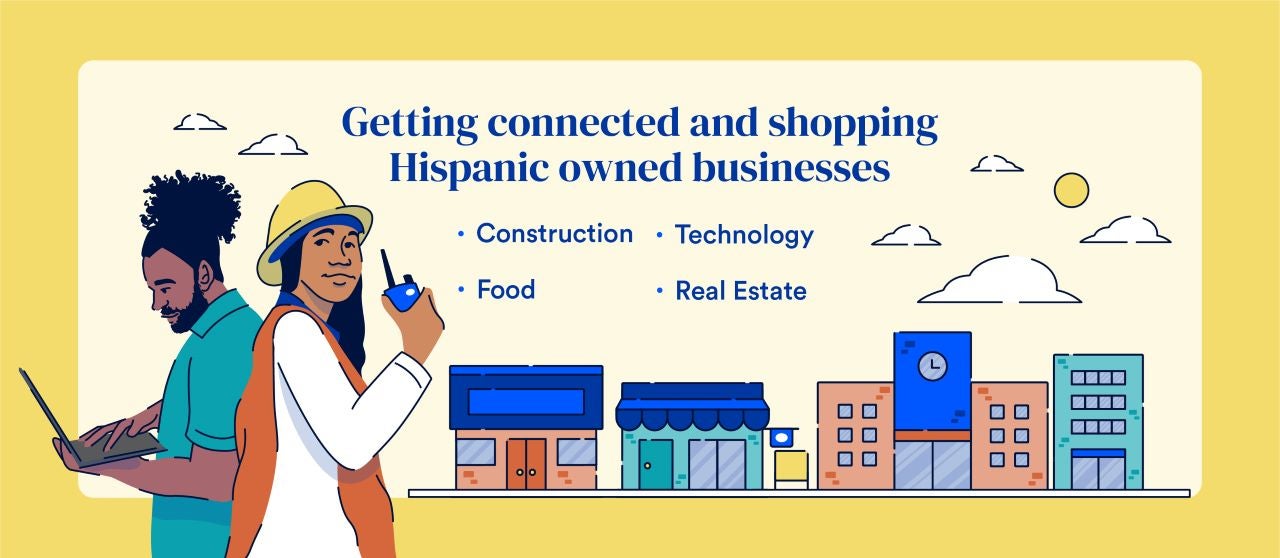Financial support for Latino and Hispanic entrepreneurs

The Bankrate promise
At Bankrate we strive to help you make smarter financial decisions. While we adhere to strict , this post may contain references to products from our partners. Here's an explanation for .
Hispanic and Latino people are one of the fastest growing demographics among entrepreneurs, and nearly 5 million businesses across the U.S. are Hispanic-owned. Despite disproportionately being affected by the Covid 19 pandemic, Latino and Hispanic entrepreneurs have proved resilient.
Many Latino business owners have used the pandemic to strengthen their businesses. However, Hispanic entrepreneurs still face systemic barriers, particularly regarding funding. In the tech industry, for example, white-owned businesses outnumber Latino-owned businesses. Still, Latino business owners who can hire employees are just as likely as white business owners to own tech companies. This example illustrates how important equal access to funding opportunities is to the success of Latino-owned businesses.
The continued growth of Latino-owned businesses is vital to American culture and the economy. Small businesses add cultural value to the communities they’re in. As small businesses across the U.S. continue to recover from the Covid 19 pandemic in the face of a looming recession, it is more important than ever that Hispanic entrepreneurs and business owners receive the financial support they need.
- Hispanic people make up 19% of the U.S. population
- Nearly 1 out of every 4 new businesses is Latino-owned
- Businesses owned by Latina women have grown more than 87% since 2007
- 61% of Latino-owned businesses reported difficulty accessing funding in 2021
- Only 20% of Hispanic-owned businesses that applied for national bank loans exceeding $100,000 were approved, compared to 50% of White-owned businesses.
- The average annual revenue for a Latino-owned business in 2021 was $162,725, a 25.6% decrease from 2020
- The average loan size for Latino-owned businesses was $47,031 in 2021, while the average loan size for non-Hispanic owned businesses was $81,156
Impact of the Latino community
It is no secret that the Latino community has hugely impacted American culture, from music and other media to fashion, cosmetics and food. The Latino community is also integral to the U.S. economy. Hispanic and Latino people in the U.S. have one of the highest employment rates at 63.2 percent. The community also accounts for 51.1 percent of population growth in the U.S.
Latino people in the U.S. make up a huge portion of consumers and entrepreneurs. Latino consumers spent $1.85 trillion in 2021, and Latino-owned businesses contribute more than $800 billion annually to the U.S. economy.
Latinos are more likely to start businesses than any other demographic, despite difficulty accessing funding. Latino business owners are also more likely to provide benefits for employees than white business owners. For example, the Stanford School of Business report found that 55 percent of Latino-owned businesses provided health insurance to employees versus 44 percent of white-owned businesses.
Financial support for Latino-owned businesses is important, not only culturally but for the overall health of the American economy. As the fastest growing sector of American entrepreneurs, Latino business owners are doing a great deal to create jobs and grow the economy. The U.S. economy would benefit if Latino entrepreneurs had the same access to capital as their white counterparts.
Statistics of Latino-owned businesses
While Hispanic-owned businesses have seen much growth over the years, it is easier for Latino entrepreneurs to start businesses in some states than in others. A study compared the number of Latino-owned businesses in each state to the number of Latino residents in each state to determine the top ten best states for Latino business owners. They found that Texas is the best state for Hispanic-owned businesses, followed by New Mexico and Nevada. The worst states for Latino-owned businesses are North Dakota, Maine and Vermont.
Below is a table representing the industries with the most Latino-owned businesses. The top industries for Latino entrepreneurs are construction, the technology industry, the food industry and real estate. Construction and food/retail services are the most common businesses among Hispanic entrepreneurs. About 27 percent of all construction workers in the U.S. are Latino, and Latinos make up more than 25 percent of the food service workforce.
| Industry | Percentage owned |
|---|---|
| Construction | 15.6% |
| Accommodation and food services | 13% |
| Professional, scientific and technical services | 10.6% |
Financial opportunities
Despite the recent growth of Latino-owned businesses, Latino entrepreneurs have a harder time accessing capital than white business owners and are less than half as likely to be approved for business loans.
Latino entrepreneurs having trouble qualifying for a business loan should consider applying for a personal installment loan to gain access to startup capital. Personal loans can be used for virtually any purpose and are generally much easier to get than business loans. However, personal loans tend to have higher interest rates than business loans, and personal loans put your credit on the line.
For Latino entrepreneurs and business owners looking for alternatives to loans, the following options could help.
General financial opportunities
Community Development financial institutions Fund (CDFI)
The CDFI is part of the U.S. Treasury and helps ensure minority-owned businesses receive financial aid and lending support. This includes loans, investments, financial services and tech assistance. The CDFI aims to contribute to economic development and sustainable growth by incentivizing banks to reinvest in underserved communities.
Latino Economic Development Corporation (LEDC)
The LEDC is a financial institution that helps local businesses by providing loans to new startups that have been in business for less than a year. The LEDC also offers a credit building program, a paycheck protection program, financial tools, business advice, and expert market advice. Loans from the LEDC can be used for vehicles, equipment, working capital, inventory, renovations, business acquisition or bridging financial gaps from previous lenders. Exact rates and terms will vary.
National Association Latino Community Asset Builders (NALCAB)
The NALCAB unites small business lenders with Latino business owners to advance economic mobility in low to moderate-income economies. This organization offers business grants and technical assistance to Latino business owners. It provides advice and expertise on small businesses and equitable neighborhood development.
Small Business Administration (SBA)
The SBA offers various services and programs for small businesses across many industries. It offers funding programs, federal contracting, business guides, learning platforms and local assistance.
Camino Financial
Camino Financial is a Los Angeles-based financial firm whose purpose is to help small businesses obtain low-cost loans. These include small business loans, microloans and startup business loans. The firm also offers resources to help business owners improve other elements of their businesses, including marketing and accounting.
Niche opportunities and grants
Digitalundivided
Digitalundivided is a nonprofit financial firm whose mission is to stimulate economic growth in the Black and Latino communities. Digitalundivided is specifically geared toward Black and Latina women. It provides industry advice, funding opportunities, community efforts and research to help advocate for women of color in business. Digitalundivided also leads programs and workshops that host keynote speakers and industry guest speakers to help build a sense of community.
USDA Rural Business Development Program
Latino business owners operating out of rural areas may be eligible for a business development grant from the USDA. These grants have very specific requirements: your business must be in an eligible location, and you must have fewer than 50 workers to qualify. No maximum grant amount exists, but smaller grant applications are a higher priority.
Opportunity Fund
The Accion Opportunity Fund is a nonprofit small business lender that offers small loans to underserved small businesses. Specifically, the Opportunity Fund tries to work with businesses owned by low and moderate-income immigrants, people of color and women. Loan amounts range from $2,600 to $250,000. The Accion Opportunity Fund also offers financial resources via videos, articles, coaching and other programs.
Grants
There are a variety of business grants available, with many federal grant opportunities geared toward small businesses. Check out Grants.gov to find a federal grant for your small business. You can search the database by finding type, industry category, etc.
Getting connected and shopping Hispanic-owned businesses

If you want to support your local Latino-owned businesses, there are many ways you can do so. Leaving a positive review or posting about the business on social media can go a long way, and small business owners appreciate it.
You can also support these businesses simply by talking about them. Many small business owners get a lot of business from word of mouth, especially in more tight-knit communities. You can also help support Latino-owned businesses by being more intentional about where you shop. If you own a business that uses suppliers, consider working with Latino-owned businesses when possible.
Simply put, the best way to support Latino-owned businesses is to buy their products and services and to encourage others in your network to do the same. You can find Hispanic-owned businesses in your community by searching Support Latino Business and other similar online directories.
The bottom line
Businesses owned by Latino entrepreneurs are vital to American culture, the communities they operate in and the U.S. economy at large. As more and more Latino entrepreneurs enter the business world, they need financial support to succeed. If you are a Latino entrepreneur looking to start or grow your business, consider some of the resources outlined above. If you are an individual who wants to help support Latino-owned businesses, put your energy toward shopping at and promoting those businesses in whatever way you can.
Related Articles



